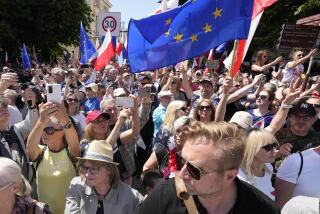Protests Keep the Heat on Croatia’s Regime
- Share via
ZAGREB, Croatia — Angry veterans of Croatia’s independence war and hard-line nationalist critics of the country’s pro-Western government protested here Thursday in an effort to derail war crimes investigations and force early parliamentary elections.
About 5,000 protesters filled a small square in front of the Croatian parliament building to demand that the center-left government call off its efforts to arrest retired Maj. Gen. Mirko Norac, 33, a popular hero of the country’s 1991 war for independence from the former Yugoslav federation.
The rally was the latest in a series of anti-government and pro-Norac protests that included road blockades last week and a rally Sunday in the town of Split that drew about 100,000 demonstrators.
“We don’t want to be accused of killings or crimes in this war,” said protester Eduard Jelenic, 58, a retired fire chief who fought against the Serb-dominated Yugoslav army in the 1991 war. “Of course I’d shoot a [Serb] before he shoots me.”
Prosecutors charge that Norac--in hiding since a Croatian court issued an arrest warrant last week--participated in the massacre of about 40 Serbian civilians during fighting in the town of Gospic in late 1991. But no one at the rally gave any credence to the charge.
“Mirko Norac is a national hero of Croatia,” said Boris Stepinac, 62, another veteran. “But a plane is prepared so the traitors [President Stipe] Mesic and [Prime Minister Ivica] Racan can hand him over to The Hague.”
Racan and Carla del Ponte, the chief prosecutor of the U.N. war crimes tribunal in The Hague, have denied there is any agreement to send Norac to the tribunal, but other Croatian military men have faced trial there.
Norac won fame for his skill in fighting better-equipped Serbian forces at Gospic. But his legendary status has been boosted by the talent he has displayed in traditional jousting tournaments in his home region of Sinj, in a sport that recalls centuries-old resistance to Ottoman Turkish forces. Some protesters Thursday carried posters showing him in traditional costume riding a white horse.
“No other war veteran could be a trigger [for anti-government protests] like him,” said prominent political analyst Slaven Letica. As both “a general from the last war” and a lancer who reminds people of “fighting Ottomans 400 or 500 years back,” Norac is a kind of a double knight who “symbolizes two big myths of the Croatian people,” he said.
Veterans groups organizing the rallies say that by pursuing war crimes charges against Norac and other Croatian soldiers, the current government--which was elected early last year after nearly a decade of authoritarian rule by the late President Franjo Tudjman--is casting aspersions on the independence struggle.
Racan has stressed that the government won’t yield to the protesters’ demands, which he says have been orchestrated by officials of Tudjman’s Croatian Democratic Union, now the main opposition party.
“The fierce attacks and protests, which have been backed by political parties that lost in democratic elections, are an attempt to overthrow the democratically elected government,” Racan told parliament last week. “The government has not interfered, and it will not, in the work of the judicial system and will not succumb to the pressure from those who wish to suspend the rule of law.”
Zeljko Malevic, a member of parliament from Racan’s Social Democratic Party, said that efforts to hide war crimes suspects threaten the honor of the independence struggle. “The way to preserve the dignity of the Homeland War,” he said, “is to deal with those few people who committed crimes.”
Malevic complained, however, that although a number of high-ranking ethnic Croats have been sent to face charges at The Hague, key Serbs accused of masterminding war crimes, including former Yugoslav President Slobodan Milosevic, remain free. This has created a perception among the Croatian public, he said, that the tribunal is biased in favor of Serbs, which adds to the domestic pressure on the government as it tries to deal with the issue.
The outpouring of support for Norac has come primarily from the country’s 180,000 veterans and their relatives, who are worried about a perceived threat of “criminalization” of the entire war effort, and from people who have suffered in Croatia’s difficult economic transition from communism to a market economy.
Although Zagreb, the capital, is relatively prosperous and the economy grew nearly 4% last year, official unemployment is at 23% nationwide, with small towns and rural areas hit especially hard.
Political divisions also have roots going back to fighting between fascist and Communist forces during World War II. Although former Communists are prominent in both the ruling coalition and the opposition, participants at Thursday’s rally charged that the current government represents a return to Communist power.
Protesters repeatedly chanted “Red Bandits,” shouted out racial and sexual slurs against top government leaders, and called for early parliamentary elections, which are three years away.
“I am pretty worried about the future because we are again opening the box of old divisions between Croats from World War II,” said Vesna Skare-Ozbolt, a member of parliament and vice president of the Democratic Center, a smaller opposition party. “For me, that’s silly--to divide again [over being] Communist or anti-Communist.”
Mesic said Thursday that he is in contact with Norac through an envoy and expects to speak directly with him soon to discuss terms under which he would give himself up.
“He is a general,” Mesic said, “and it is normal that he speaks to me and that as a soldier he is asking for certain treatment.”
More to Read
Sign up for Essential California
The most important California stories and recommendations in your inbox every morning.
You may occasionally receive promotional content from the Los Angeles Times.













